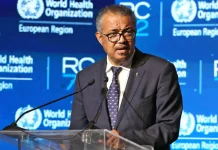The Nigeria Centre for Disease Control (NCDC) has increased surveillance efforts in response to the recent outbreak of Ebola in Uganda. On January 30, the World Health Organization (WHO) confirmed an outbreak of Sudan Virus Disease (SVD), a strain of Ebola, in Uganda.
Like the Ebola Virus Disease (EVD), SVD is a highly infectious hemorrhagic fever transmitted through contact with bodily fluids and tissues. The outbreak has already resulted in the death of a nurse who developed fever-like symptoms and passed away while seeking treatment in Kampala, the capital of Uganda.
In a statement, the NCDC confirmed that there are no reported cases of EVD in Nigeria. However, the agency, in collaboration with relevant ministries, agencies, and partners through the National Emerging Viral Haemorrhagic Diseases (EVHD) Technical Working Group, is closely monitoring the situation and taking proactive steps to enhance preparedness.
These measures include updating the EVD emergency contingency plan, increasing surveillance at points of entry, and improving diagnostic capacity for EVD testing at designated laboratories in cities with international airports, as well as the National Reference Laboratory.
The NCDC also stated that Lassa Fever testing laboratories can be activated to scale up testing if necessary.
Following a dynamic risk assessment conducted in light of the recent Marburg outbreak in Rwanda, the risk of Ebola in Nigeria has been classified as moderate.
“A moderate risk classification suggests that EVD, without mitigation measures, could potentially spread in Nigeria, with significant public health consequences. Therefore, necessary precautions are essential,” the statement read.
While vaccines and therapeutics exist for certain strains of Ebola, the NCDC noted that the approved vaccine for the Zaire species (EBV) is not available in Nigeria and does not protect against the Sudan virus.
The agency emphasized that early identification, isolation of patients, supportive treatment, infection control measures in health facilities and households, contact tracing, and safe burial practices are critical in reducing morbidity and mortality rates.
The NCDC also encouraged Nigerians to take preventive steps, such as regular handwashing, avoiding the consumption of bushmeat, and limiting travel to countries with confirmed Ebola cases unless absolutely necessary.










